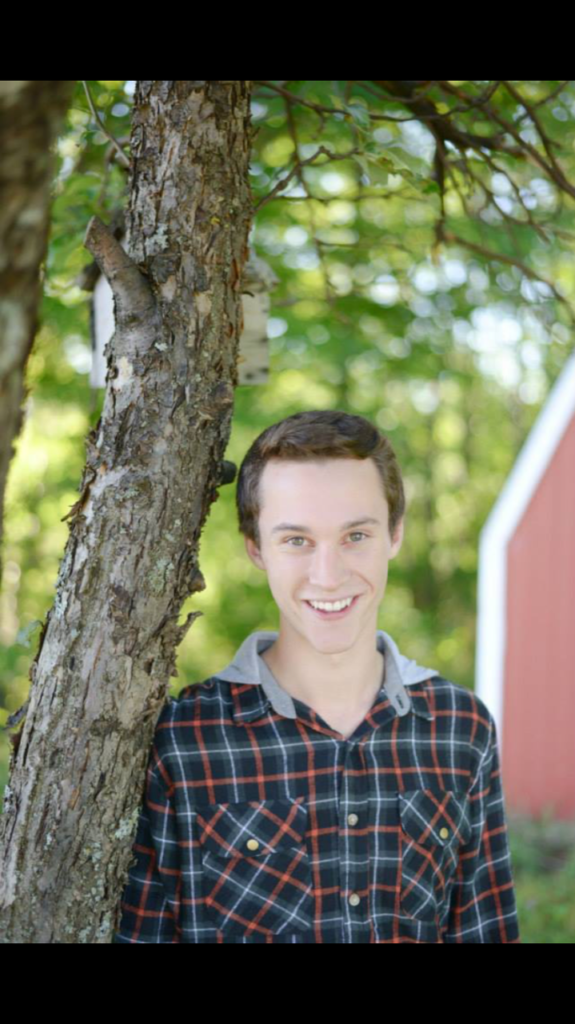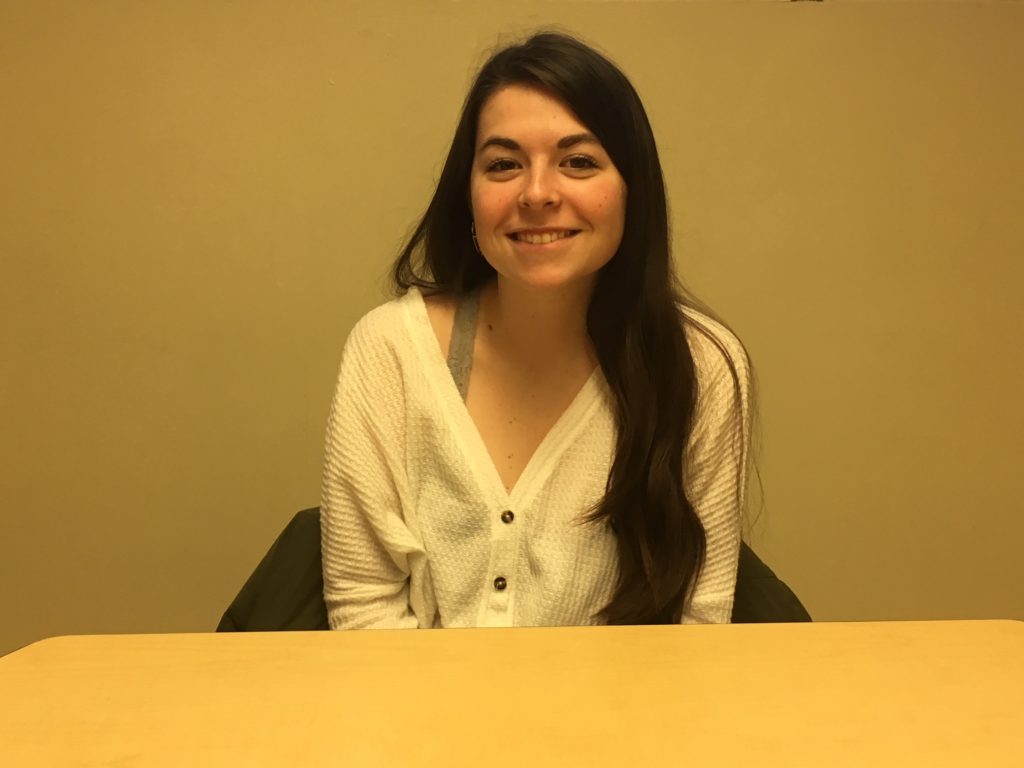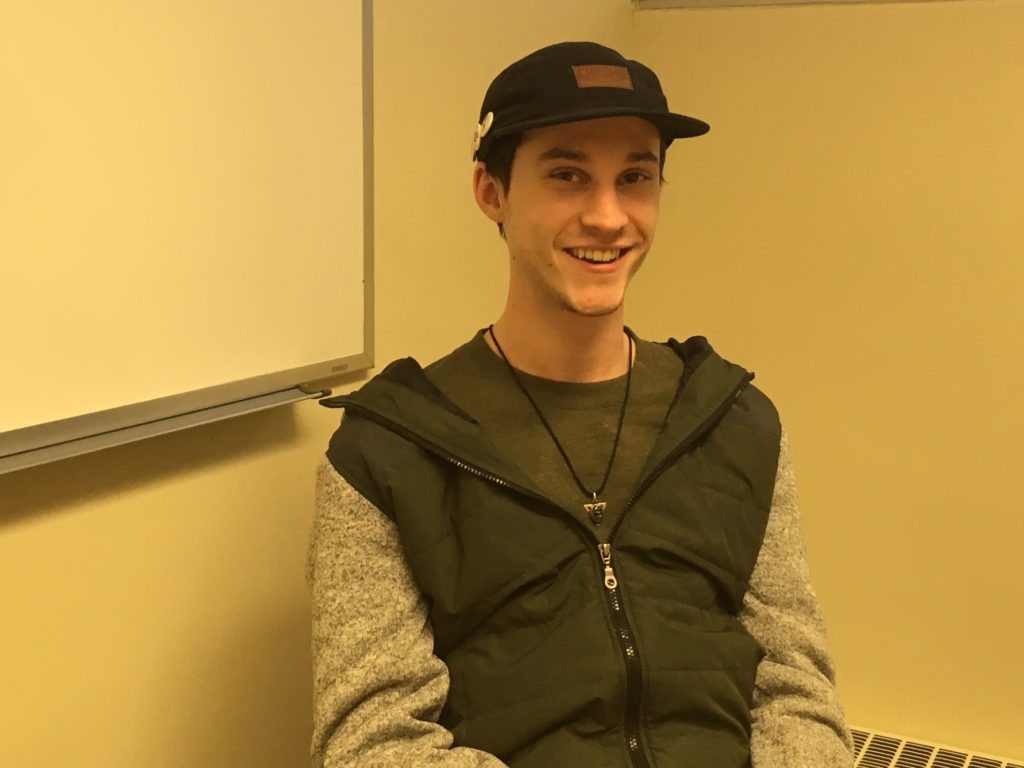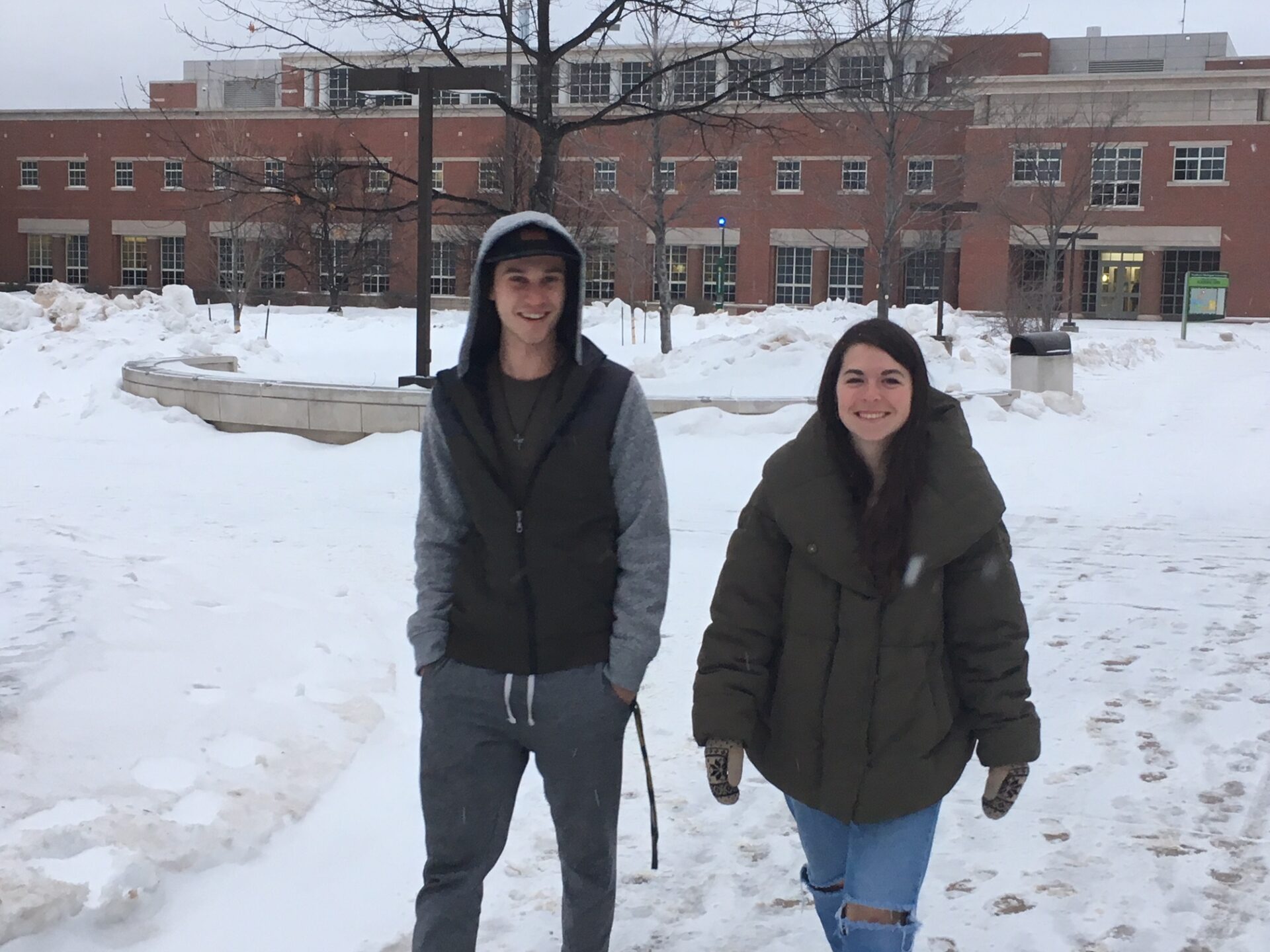IF YOU WATCH them strolling across the snowy NMU campus, you see a pretty 20 year old brunette with long hair, and a boyish looking 19-year-old wearing a ball cap and a hoodie.
If you talk to them, you’ll discover that they’re smart, thoughtful, and gregarious. Regular college kids, eager to talk and ready with their smiles.
Chloe Gerathy and Grant Daignault also happen to be gay–on a campus where they estimate that only about 100-200 students publicly identify as being gay. That’s not many–less than 2% of the student population. That’s far less than the population at large.
So, as a distinct minority, these two young students must feel alone and isolated, right? No, not even close. We’ll get to that in a few minutes, but first some background.
Chloe, a junior, was raised in Highland, Michigan, a small town outside of Ann Arbor. She suspected she was gay in middle school.
“Everybody was starting to get their first boyfriend,” she explains, “and I was, like, ‘I guess I’ll get a boyfriend too’ because that’s what all the cool girls were doing, but I just wasn’t getting as excited as everybody else was. Then I never really got excited about boys at all.”
She “came out” officially when she was 16. “I told my best friend because it was already starting to leak out at school,” she says “and then I gathered all my friends to tell them personally. I just didn’t want people whispering about me anymore. And then I tweeted it to get ahead of the story. That tweet had way more hits than anything else I had ever posted.” She laughs.

Negative feedback? Not much, she says, just a little from potential boyfriends who were disappointed, and a few religious friends. “They were saying, ‘This isn’t your fault!’ And they wanted to take me to church to help me figure out what was wrong with me so that it wouldn’t be the end of my life.” She smiles.
Grant is a sophomore, a hometown boy, a graduate of Marquette Senior High School. “I came out my junior year in high school,” he says. “I had gotten in some trouble at school and I came home and my parents sat me down to talk about it. And my mom says, ‘What’s going on with you? Are you having problems? Girl problems? Are you gay?’ And I said, ‘Yeah.'”
He figured his mom already knew but his dad, who’s now very supportive, seemed shocked. “The first thing he said was, ‘Well, can’t you at least try girls?'”

Grant never made any official announcement at school. “People just knew. They saw it. They were super-supportive. I never–not even once–got any crap from anyone at MSHS.”
They both decided to come to NMU–Chloe because her grades plummeted in her senior year while she was grappling with the pressures of being “out” and she didn’t have many options, and Grant, because NMU was his hometown university and he loves Marquette.
Chloe hung a a rainbow banner in her dorm room and tried, like all freshmen, to fit in. Parties were sometimes problematic.
“My girlfriend and I were dancing at a party,” she says, “and these guys were trying to film us. And we said, ‘Just go away. We’re just trying to have fun.’ We were upset at them, they got mad at us. And when we left, they threw a rock at our car.”
Then, another off-campus party. “There were three or four of us there,” she remembers, “and some guy was really drunk and he said it was really cool that we were gay, and he put his arms around us, and then he whispered in my ear something really vulgar, and I said, ‘You need to leave us alone. Now!’ Then he got belligerent, pulled a knife out of his pocket and flicked it open, and said, ‘Don’t tell me what to do!'”
Drunk college boys. Guys she didn’t know.That’s the problem with freshmen year–you’re trying to make friends and sometimes you run into people who wouldn’t normally be in your social circle. But Chloe says for the last two years, she’s had no problems at NMU.
Grant’s faced no such difficulties at Northern. Oh, sometimes he’ll hear the word “faggot” used in conversations but he’s convinced it’s just ignorance, not ill will; some straight guys just don’t know any better.
Both Grant and Chloe concede that they probably draw a little more attention than the average student. “When I’m at parties with guys,” Grant says,” I’ll notice people are looking at us and whispering to each other. I don’t think they’re saying anything bad. It’s just something new to them.”
“It can get really obvious at the Den and the Marketplace (dining areas),” Chloe adds. “My girlfriend and I would grab lunch there nearly every day for the first two years, and we could feel people staring and whispering. If you’re having a particularly bad day, and people are staring, it can really wear you down.”
How about the faculty? Do professors single them out in any way?
“Some of them get excited about it,” Grant says, “because they say, ‘Oh, a different perspective!'”
“One of my professors tells me ‘I love that you’re not afraid to bring difficult conversations into the classroom,” Chloe adds.

They’re fine with it. Yeah, the gay experience is worth talking about but it’s no longer shocking to students, gay or straight. It’s been normalized in the last couple of decades. Most gays and straights at NMU, they say, mix socially.
“Both of us have a massive mix of friends,” Grant says. “We’re not defined by our groups. I have friends who are skaters, artsy, spiritual, nature-centered, wild, eccentric. The entire sexuality spectrum.” Four of his best friends happen to be straight.
Chloe has five housemates–four straight females, one straight male, and Chloe. “All my friends are super different. As long as you have that common denominator of accepting different personalities, you’re going to have fun.”
“The people at Northern are friendly,” Grant says. “It’s got to be one of the friendliest campuses in the nation. A lot of these other colleges have big fraternities. Frat parties. That’s where the discrimination starts. It’s all about testosterone. Gays aren’t allowed in. Here, we don’t have any of that.”
There’s no Frat Row at Northern.
“The fraternities and sororities can be very cliquey,” Chloe says. “Here at Northern, that’s just nonexistent. I think we’re becoming a generation–especially here at Northern–that accepts everyone just the way they are.”
Gotta ask, though: Are they comfortable publicly showing attention to their boyfriend or girlfriend on campus?
“I’ve just never been one for PDA (public displays of affection),” Chloe tells you. “By anybody. I always kinda cringe when I see a guy shoving his tongue down a girl’s throat.”
“Sometimes you say, ‘Wow! Straight people are gross!'” Grant laughs.

Now, about the apparently low numbers of publicly identified gays at Northern. Seems a little strange. Both Chloe and Grant speculate that maybe gays are deterred from coming to the Upper Peninsula because they assume it’s conservative and hostile toward gays. That might be the case in parts of the U.P., but certainly not in Marquette.
And some young gays, they believe, might be drawn to larger universities where they know there’ll be a large established community of gays on campus. But Grant believes that may actually be a drawback. “The reason our friends are so diverse,” he points out, “is we don’t have the option of clinging to a large group of gay and lesbian students. We’re friends with everybody.”
There’s only one operating gay group on campus: Queers and Allies. They meet and talk, stage small events, along with one really big one–the yearly and hugely attended Drag Show.
“But we’re not a force on campus,” Chloe says. “Not at all. We not really political. Yeah, I guess I’d be considered a bleeding heart liberal, but I’m here to go class, make friends, and get internships.”
Strange. Normal. And encouraging. Being gay is apparently no longer that big of a deal.
The younger generation figured it out a helluva lot faster than the Baby Boomers.
You got news? Email me at briancabell@gmail.com


